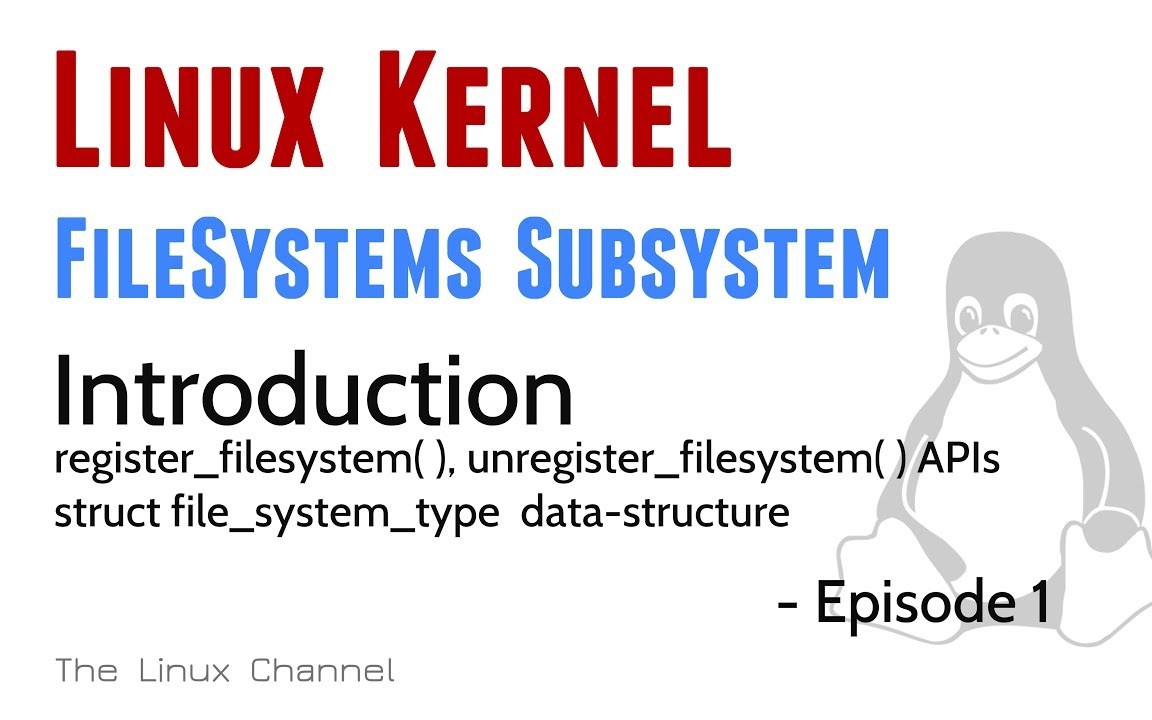Refer:
Wiki File system ↗
Linux Kernel Source:
/fs/filesystems.c ↗
register_filesystem(), unregister_filesystem() APIs ↗
struct file_system_type data-structure ↗
Linux Kernel – ext4 filesystem type:
static struct file_system_type ext2_fs_type ↗
static struct file_system_type ext3_fs_type ↗
static struct file_system_type ext4_fs_type ↗
static int __init ext4_init_fs(void) ↗
Here is the register_filesystem(), unregister_filesystem() APIs (/fs/filesystems.c) from the Kernel-source version 6.5.9 for quick reference:
/**
* register_filesystem - register a new filesystem
* @fs: the file system structure
*
* Adds the file system passed to the list of file systems the kernel
* is aware of for mount and other syscalls. Returns 0 on success,
* or a negative errno code on an error.
*
* The &struct file_system_type that is passed is linked into the kernel
* structures and must not be freed until the file system has been
* unregistered.
*/
int register_filesystem(struct file_system_type * fs)
{
int res = 0;
struct file_system_type ** p;
if (fs->parameters &&
!fs_validate_description(fs->name, fs->parameters))
return -EINVAL;
BUG_ON(strchr(fs->name, '.'));
if (fs->next)
return -EBUSY;
write_lock(&file_systems_lock);
p = find_filesystem(fs->name, strlen(fs->name));
if (*p)
res = -EBUSY;
else
*p = fs;
write_unlock(&file_systems_lock);
return res;
}
EXPORT_SYMBOL(register_filesystem);
/**
* unregister_filesystem - unregister a file system
* @fs: filesystem to unregister
*
* Remove a file system that was previously successfully registered
* with the kernel. An error is returned if the file system is not found.
* Zero is returned on a success.
*
* Once this function has returned the &struct file_system_type structure
* may be freed or reused.
*/
int unregister_filesystem(struct file_system_type * fs)
{
struct file_system_type ** tmp;
write_lock(&file_systems_lock);
tmp = &file_systems;
while (*tmp) {
if (fs == *tmp) {
*tmp = fs->next;
fs->next = NULL;
write_unlock(&file_systems_lock);
synchronize_rcu();
return 0;
}
tmp = &(*tmp)->next;
}
write_unlock(&file_systems_lock);
return -EINVAL;
}
EXPORT_SYMBOL(unregister_filesystem);Here is the struct file_system_type data-structure (/include/linux/fs.h) from the Kernel-source version 6.5.9 for quick reference:
struct file_system_type {
const char *name;
int fs_flags;
#define FS_REQUIRES_DEV 1
#define FS_BINARY_MOUNTDATA 2
#define FS_HAS_SUBTYPE 4
#define FS_USERNS_MOUNT 8 /* Can be mounted by userns root */
#define FS_DISALLOW_NOTIFY_PERM 16 /* Disable fanotify permission events */
#define FS_ALLOW_IDMAP 32 /* FS has been updated to handle vfs idmappings. */
#define FS_RENAME_DOES_D_MOVE 32768 /* FS will handle d_move() during rename() internally. */
int (*init_fs_context)(struct fs_context *);
const struct fs_parameter_spec *parameters;
struct dentry *(*mount) (struct file_system_type *, int,
const char *, void *);
void (*kill_sb) (struct super_block *);
struct module *owner;
struct file_system_type * next;
struct hlist_head fs_supers;
struct lock_class_key s_lock_key;
struct lock_class_key s_umount_key;
struct lock_class_key s_vfs_rename_key;
struct lock_class_key s_writers_key[SB_FREEZE_LEVELS];
struct lock_class_key i_lock_key;
struct lock_class_key i_mutex_key;
struct lock_class_key invalidate_lock_key;
struct lock_class_key i_mutex_dir_key;
};